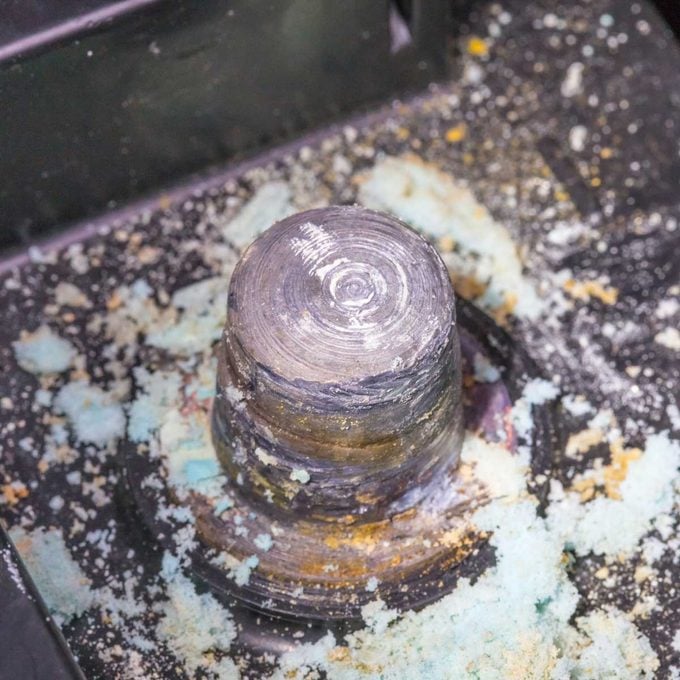What Does It Mean if My Car Battery Has a Blue Substance on the Battery Cells and Keeps Dying
Every editorial product is independently selected, though we may be compensated or receive an affiliate commission if you buy something through our links. Ratings and prices are accurate and items are in stock as of time of publication.
Noticing some white, powdery stuff around your car's battery terminals? It's corrosion. Learn why car batteries corrode and what to do about it.

When you see corrosion, it's a sign of a chemical action causing something to gradually disintegrate. In the case of corrosion on your vehicle's battery, acid from inside is reacting with the metal on the outside.
What Causes Battery Corrosion
If you periodically pop open your vehicle's hood to check the oil, washer fluid, transmission fluid or anything else, chances are you'll eventually will see a whitish-blue, granular substance around the battery terminals. This is a sign of corrosion and it should never be ignored. There are several possible causes but they all boil down to the same thing: Corrosive liquids or gases from inside the battery escaping and reacting with the metal contacts and battery terminals, causing them to corrode.
If you notice corrosion on your battery, clean the terminals and cable connectors right away. Let battery corrosion fester too long and it could stop the battery terminals from conducting properly, harming the battery and vehicle. Cleaning the corrosion from your battery terminals is important, and so is understanding why it happens.
Leaking Battery Fluid
All vehicle batteries contain a mixture of sulfuric acid and water that reacts with lead alloy plates inside the battery casing, which generates electricity. Old-style batteries (a.k.a. non maintenance free or refillable) have removable caps for checking and topping off the acidic solution with distilled water, if it gets low. These caps have tiny vent holes through which small amounts of acid can leak if the battery is overfilled.
If leaked sulfuric acid in the battery fluid touches the battery terminals or cable contacts, it will cause them to corrode. If it goes on long enough, a large deposit of powdery corrosion can build up.
The warmth generated by overcharging a battery can also lead to battery fluid leakage, by causing the fluid to expand and dribble through the vents.
Venting Gases
Even if your battery isn't the refillable type, your battery has small vents through which sulfuric gases inside can escape. If these escaping gases come in contact with the battery terminals or cable contacts regularly, corrosion could occur. Whether this is the cause of your battery corrosion problem depends on the location of your battery's vents, and how much gas escapes through them.
Old Battery
If your battery is more than five to seven years old, it's probably nearing the end of its useful life and slowly losing its ability to hold a charge. When batteries reach this stage, corrosion around the terminals is to be expected. If you've ruled out battery fluid leakage as a cause of corrosion and your battery is five or more years old, do some tests to see if it might need to be replaced.
Removing Corrosion
Unless you've been overcharging your battery, or it's the refillable type and you've overfilled it, there's not much you can do to ensure corrosion never happens. Just check your terminals regularly and clean them when you notice corrosion.
Disconnect the battery cables, then use a stainless steel wire brush to clean the terminals and cable contacts until they're free of corrosion. Reconnect the battery, then coat the terminals and contacts with anti-corrosion grease.
If the platform where the battery sits is metal rather than plastic, it's also a good idea to disconnect and remove the battery every couple of years and spray the platform with a rust preventative solution.
Safety note: Any time you're working with your car battery, be sure to wear safety glasses and thick rubber gloves.
Source: https://www.familyhandyman.com/article/car-battery-corrosion/#:~:text=If%20you%20periodically%20pop%20open,it%20should%20never%20be%20ignored.
0 Response to "What Does It Mean if My Car Battery Has a Blue Substance on the Battery Cells and Keeps Dying"
Post a Comment